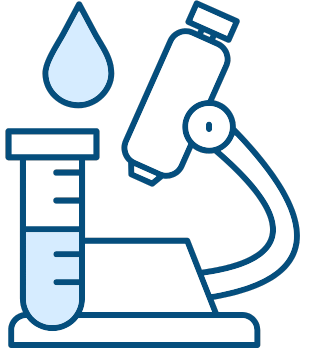Dizziness and unusual tiredness can not only interfere with our busy daily routines, but can also be a sign of bigger problems such as anaemia. “In this article, the Drops clinic family clinic specialists will introduce you to the treatment and symptoms of anaemia, also known as anaemia, and advise you on how to recognise the latter. We will discuss methods of treating and diagnosing anaemia, including blood tests and medical advice. We will also provide preventive measures such as a balanced diet, sufficient iron intake and a healthy lifestyle. Finally, we will present general recommendations for the effective treatment of anaemia with intravenous drug therapy, which helps to replenish the body’s iron stores and improve haematopoietic functions. Our aim is to help you better understand this condition so that you can take appropriate action to ensure your health and well-being.
Translated with DeepL.com (free version)
Our servicesWhat is anaemia?
Anaemia, also known as anaemia, is a condition in which the number of healthy red blood cells (erythrocytes) in the body, which are responsible for carrying oxygen from the lungs to all the body’s tissues, is reduced. The main function of these blood cells is to produce and transport haemoglobin, a protein that binds to oxygen, through the bloodstream. The more red blood cells there are, the more efficiently oxygen is transported to the body’s cells, which is vital for the functioning of all organs and systems.
There are several main types of anaemia, with different causes and origins. For example, iron deficiency anaemia is caused by insufficient iron in the body, while vitamin B12 deficiency anaemia is caused by inadequate intake of vitamin B12 or by absorption problems. Another type, haemolytic anaemia, is associated with the too rapid destruction of red blood cells.

There are also forms of anaemia associated with chronic diseases such as kidney failure or autoimmune conditions. In addition, there is aplastic anaemia, which is caused by a malfunction of the bone marrow, thereby reducing the production of new blood cells.
Each type of anaemia has its own unique cause and requires a different approach to diagnosis and treatment. “Drops clinic family clinic specialists stress the importance of identifying the underlying cause in order to treat the patient properly and prevent complications. For example, in the case of iron deficiency anaemia, appropriate iron supplementation is required, while vitamin B12 injections are needed to treat vitamin B12 deficiency anaemia. Drip iron and vitamin therapy for anaemia can be used in a variety of situations, depending on the cause and the needs of the patient.
What causes anaemia?
The development of anaemia can be due to a variety of causes, and identifying them is important for effective treatment. The most common cause of anaemia is iron deficiency, which can result from inadequate iron intake, increased body demand, poor absorption or blood loss. Iron deficiency anaemia is the most common form of anaemia.
Other causes of anaemia include deficiencies of vitamin B12 and folic acid associated with inadequate intake, absorption disorders or certain chronic diseases. Haemolytic anaemia occurs when red blood cells are destroyed too quickly or inappropriately, while aplastic anaemia is associated with impaired bone marrow function and insufficient production of new blood cells.
Chronic diseases such as kidney failure, rheumatoid arthritis or cancer can also cause anaemia as they can affect bone marrow function or cause inflammation, which inhibits red blood cell production. In addition, certain genetic conditions, such as thalassaemia or spherocytosis, can cause anaemia due to congenital features in the structure of haemoglobin or red blood cells.
Finally, anaemia can be caused by certain drugs, radiation therapy or chemotherapy, which can affect the bone marrow and disrupt blood cell production. Given these various causes, it is important to contact the Drops clinic family clinic specialists for a thorough examination and proper diagnosis of anaemia so that effective treatment can be started.
What are the symptoms of anaemia?
Symptoms of anaemia can vary depending on the severity of the anaemia and its cause. The most common symptoms are general tiredness, weakness, dizziness and headaches. This is caused by a reduction in the amount of oxygen in the tissues, as red blood cells are responsible for transporting oxygen.
Some people may notice pale skin, especially on the face, hands and inner eyelids, as anaemia affects skin colour. You may also experience chills, palpitations, shortness of breath and chest pain, especially with physical exertion. Lack of oxygen to the brain can lead to reduced concentration, memory and problem-solving skills.

Some people with certain forms of anaemia may experience additional symptoms, such as inflammation of the tongue, splitting of the lips or numbness in the hands and feet. These symptoms are more typical of vitamin B12 deficiency anaemia.
It is important to stress that the symptoms of anaemia can be subtle and slowly progressive, and can often be attributed to other causes or simply to fatigue. If you notice one or more of these symptoms, contact the Drops clinic family clinic for a full examination and diagnosis. Early detection and treatment of anaemia can help prevent serious complications and improve quality of life.
Our servicesDiagnosing anaemia
Diagnosing anaemia is an essential step in determining the right treatment and preventing possible complications. The diagnosis process starts with a thorough interview with the patient, where the doctor asks about symptoms, previous health problems and family medical history. “Drops clinic family clinic specialises in the diagnosis and treatment of a wide range of medical conditions, including anaemia, so Drops clinic family clinic specialists can help you identify the symptoms of anaemia quickly and effectively.
If anaemia is suspected, further blood tests are carried out to determine the levels of red blood cells, haemoglobin and haematocrit. If these values are reduced, this may indicate anaemia. After evaluating the results of the tests, the Drops clinic family clinic team will make an accurate diagnosis and prepare an optimal treatment plan for you.
If necessary, your doctor may prescribe additional tests to determine the cause of your anaemia. This may include blood tests for iron, folic acid, ferritin and vitamin B12, or other specific tests, depending on the individual patient’s needs. Among all the tests, it is very important to test the levels of ferritin in the blood, as ferritin is the protein responsible for the accumulation of iron stores in the body. It should be stressed that even if the blood iron level is sufficient, this does not guarantee that there is no anaemia, as the ferritin level may be very low. In addition, ferritin helps to regulate iron levels in the cells and allows the body to safely access iron when it is needed. Thus, a low ferritin level may indicate that iron stores in the body are inadequate, despite normal iron levels in the blood.
Once the exact type of anaemia has been determined, Drops clinic family clinic specialists offer a personalised treatment plan, which may include dietary changes, medications such as drip iron or intravenous vitamin therapy, depending on the specific cause and the patient’s condition. Once treatment has been prescribed, Drops clinic’s family clinic specialists continuously monitor the progress of the treatment and adapt to your needs, while aiming for an effective and quality recovery.
Droplets for anaemia
Drug and vitamin therapy for anaemia is a modern and effective treatment strategy that not only restores the balance of vitamins and minerals in the human body, but also reduces the symptoms of anaemia and improves overall health. “Drops clinic’s family clinic specialists provide this treatment, which is individually tailored to each patient, based on detailed blood test results and the identified causes of anaemia.
Treatment of anaemia with drip therapy is one of the most effective ways to help anaemic patients. This method

Vitamin therapy is particularly useful for patients who, for various reasons, have difficulty absorbing nutrients from food or tablets. This treatment helps to reduce symptoms, increase energy levels and improve overall quality of life.
“Drops clinic family clinic’s drip therapy treatments are comfortable, safe and quick, lasting between 30 and 60 minutes, depending on the patient’s individual treatment plan. The procedure is carried out by experienced and qualified medical professionals, ensuring a high level of safety and effective treatment. Vitamin therapy is a proven and effective treatment to improve the health and quality of life of anaemic patients.
Other ways to treat and prevent anaemia
We aim to personalise anaemia treatment and prevention strategies according to the patient’s needs, the type and severity of anaemia. “Drops clinic’s family clinic specialists help develop effective treatment plans that include proper nutrition, medications, lifestyle changes and medical procedures to improve patients’ health and quality of life.
Diet is one of the main factors determining blood composition. To prevent anaemia, it is recommended to consume foods rich in iron, vitamin B12, folate and other important substances. Foods rich in iron include meat, fish, poultry, eggs, legumes, nuts and cereals. Sources of vitamin B12 include meat, fish, dairy products and eggs, while folate can be found in vegetables, fruit, cereals and pulses.

“Drops clinic family clinic specialists may be able to prescribe intravenous medications such as iron drops, vitamin B12 injections, folic acid supplements and other substances to treat anaemia.
Lifestyle changes are also an important part of anaemia treatment. Physical activity helps to improve blood circulation, which in turn improves the delivery of oxygen to body tissues. However, it is important to find the right level of physical activity to help reduce stress and improve blood composition without causing excessive fatigue. Stress reduction is also an important factor in the treatment of anaemia. This can be achieved through relaxation techniques such as meditation, breathing exercises or yoga, which help to relax the body and mind.
A comprehensive approach to the treatment of anaemia, including diet and lifestyle changes, helps to ensure long-lasting improvement and empowers patients to live full and active lives.
register for a visitPrevent anaemia
It’s important to take care of your health and listen to your body’s signals. If you suspect you may have anaemia, don’t let it go unnoticed. Contact the specialists at Drops clinic family clinic who will help you to carry out the necessary tests and determine the right treatment for your anaemia, such as vitamin therapy for anaemia or IV drips to treat anaemia. Drip iron and vitamin therapy for anaemia can help restore your energy, improve your quality of life and prevent further health problems. Remember that your health is your most valuable asset, and the right treatment and professional support can help you to keep it at its best.




